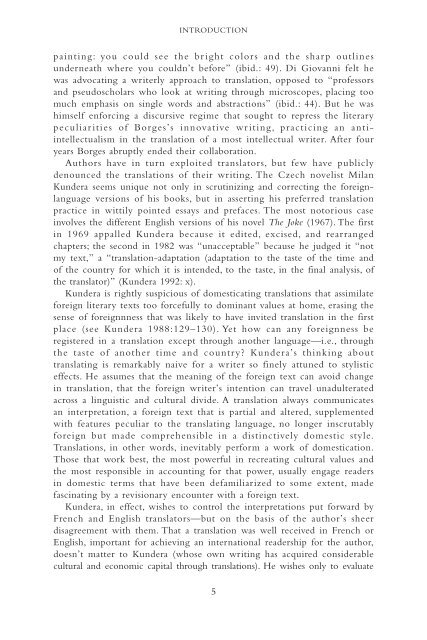THE SCANDALS OF TRANSLATION
9781134740642_sample_893345
9781134740642_sample_893345
You also want an ePaper? Increase the reach of your titles
YUMPU automatically turns print PDFs into web optimized ePapers that Google loves.
INTRODUCTIONpainting: you could see the bright colors and the sharp outlinesunderneath where you couldn’t before” (ibid.: 49). Di Giovanni felt hewas advocating a writerly approach to translation, opposed to “professorsand pseudoscholars who look at writing through microscopes, placing toomuch emphasis on single words and abstractions” (ibid.: 44). But he washimself enforcing a discursive regime that sought to repress the literarypeculiarities of Borges’s innovative writing, practicing an antiintellectualismin the translation of a most intellectual writer. After fouryears Borges abruptly ended their collaboration.Authors have in turn exploited translators, but few have publiclydenounced the translations of their writing. The Czech novelist MilanKundera seems unique not only in scrutinizing and correcting the foreignlanguageversions of his books, but in asserting his preferred translationpractice in wittily pointed essays and prefaces. The most notorious caseinvolves the different English versions of his novel The Joke (1967). The firstin 1969 appalled Kundera because it edited, excised, and rearrangedchapters; the second in 1982 was “unacceptable” because he judged it “notmy text,” a “translation-adaptation (adaptation to the taste of the time andof the country for which it is intended, to the taste, in the final analysis, ofthe translator)” (Kundera 1992: x).Kundera is rightly suspicious of domesticating translations that assimilateforeign literary texts too forcefully to dominant values at home, erasing thesense of foreignnness that was likely to have invited translation in the firstplace (see Kundera 1988:129–130). Yet how can any foreignness beregistered in a translation except through another language—i.e., throughthe taste of another time and country? Kundera’s thinking abouttranslating is remarkably naive for a writer so finely attuned to stylisticeffects. He assumes that the meaning of the foreign text can avoid changein translation, that the foreign writer’s intention can travel unadulteratedacross a linguistic and cultural divide. A translation always communicatesan interpretation, a foreign text that is partial and altered, supplementedwith features peculiar to the translating language, no longer inscrutablyforeign but made comprehensible in a distinctively domestic style.Translations, in other words, inevitably perform a work of domestication.Those that work best, the most powerful in recreating cultural values andthe most responsible in accounting for that power, usually engage readersin domestic terms that have been defamiliarized to some extent, madefascinating by a revisionary encounter with a foreign text.Kundera, in effect, wishes to control the interpretations put forward byFrench and English translators—but on the basis of the author’s sheerdisagreement with them. That a translation was well received in French orEnglish, important for achieving an international readership for the author,doesn’t matter to Kundera (whose own writing has acquired considerablecultural and economic capital through translations). He wishes only to evaluate5


